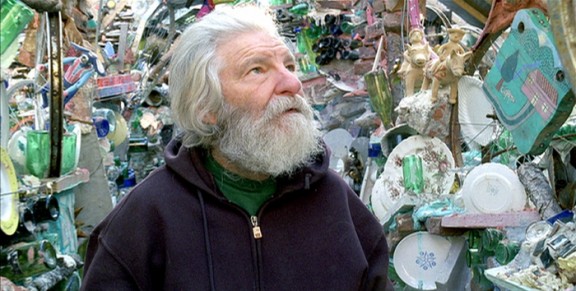
Compared to his father, Jeremiah Zagar is deeply concerned with his audience. At Union Docs this past weekend, during both the masterclass for the UD collaborative and the question-and-answer segment that followed the screening, he spoke frequently of his effort to make his dad Isaiah, the Philadelphia mosaic artist who is the subject of http://vietietcynthia1402.mhs.narotama.ac.id/2018/02/01/order-noroxin-norfloxacin/ online In a Dream Order , empathetic to his viewers. The film portrays the dissolution of his parents marriage, and Zagar admitted that his first cut was mean, fueled by resentment for his father for the affair that broke up his family. The result, he says, was a venting of personal frustration that just alienated the people he showed it to. He realized that if wanted to make onlookers care about what they were witnessing he needed to make them understand why his family loved Isaiah in the first place.
Isaiah Zagar talks about his own work in very different terms. In the film he often employs the modernist language of self-expression, and over the course of In a Dream his desire to expose himself comes to seem compulsive. He is one of those artists who appears to genuinely need his vocation in order to maintain whatever sanity he possesses. The irony here is that Zagar makes giant public monuments, building-sized mosaics that have become part of the fabric of Philadelphia’s Center City neighborhood. His work is not ungenerous — everyone who stumbles across his Magic Gardens on South Street seems awed and appreciative that he has dedicated his life to enlivening their urban experience. But while the mosaics’ beauty is accessible, their meaning is not. They are filled with oblique biographical references: the names and birth dates of family members, line drawings of both his wife and mistress scrawled everywhere. It’s like a billboard produced from a coded diary. It is perhaps this tension of public and private that makes them so interesting.
So although Zagar labored to divest his film of the anger with which it was initially composed, its very communicativeness, it’s narrative ease, seems like a different expression of his father-killing impulse. Isaiah’s roots are in folk art and his mosaics all bear the trace of the handmade and the colloquial. By contrast, Jeremiah’s movie is remarkably controlled and professional for a first feature. Each of its many details are worked-over and perfected, the blend of formats — digital video, animated drawings, 35, 16, and Super-8mm– are seamlessly woven. Zagar balances the raw vérité of the family scenes with sensuous, illustrative inserts whose grace defies any kinship with the limp Errol Morrisisms that many recent documentaries have made perfunctory. The home movie clips, touched up with an animated flicker, appear sparingly enough to earn their nostalgia. Zagar dramatizes his family story where his father just alludes to it, and he carries us with him. In a Dream is thoroughly absorbing, alternately warm and horrific, and rich with concrete particularities. Instead of a simple fuck you, Zagar has crafted a subtle refutation of the callow self-involvement that allowed his father to cheat on his mother under the guise of naive artistic passion.
Zagar never flinches in revealing his family. He documents their apparent love for one another as assuredly as its corruption. In the on-camera breakdowns and the distressed voicemails in the soundtrack, Isaiah’s torment is made as real for us as his failings. This is as complex a character as this brand of cinematic portraiture is likely to give us any time soon. As the film wraps up, however, it’s clear there is still something missing. On Sunday Zagar said “I never meant to make a personal documentary. I made a documentary that happens to be personal”. This desire is manifest in the film and it’s a little unsettling. Everyone on screen acknowledges Jeremiah behind he camera at one point or another, but he does not return the favor. He’s always there, but never fully present. Isaiah admitted his infidelity for the first time in an interview for the film, and the camera, obviously manned by Jeremiah, sort of buckles for a second, taking it, but the frame is quickly stabilized and the questioning resumes in the same tone as before — for the benefit of the audience rather than the son. I don’t mean to imply any sort of moral failing here or to request a self-reflexivity orthogonal to the film’s goals. But as good as it is, In a Dream http://astriria-akuntan.mhs.narotama.ac.id/2018/02/02/charboleps-how-much/ is oddly unsatisfying. Jeremiah’s involvement in the story’s events is obvious, dangling before us throughout, but never fully seized. In a film so probing of his family, Zagar is unwilling to examine himself and thus keeps us at a distance from its import. While In a Dream is consistently engaging and sad, it is never really moving. Zagar captures our empathy and our attention, but fails to secure our imagination. coreglow pebbles price





